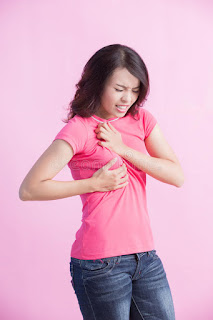What is chest pain?
- What are the causes of chest pain?

- Chest pain is the sudden reminder of a heart attack but there are many other medical conditions which also cause chest pain. Some causes of chest pain are dangerous or life-threatening but not all of them. From sharp stabbing pain to dull ache chest pain has many forms. Sometimes it has a crushing or burning sensation.
Chest pain
can be triggered by many organs or tissues of the body like heart, lungs,
oesophagus, muscles, ribs, tendons, nerves etc. The pain can travel to the chest
from other organs like the neck, back, abdomen etc.
Finding the real cause of chest pain requires conducting of certain tests mainly like a blood
test, X-rays, CT scans and others. The doctor also requires the medical
history of the patient to ascertain the cause of chest pain. Initially, it is
difficult to differentiate between a heart attack or non- life-threatening issues like
heartburn.
Symptoms of
Chest pain:-
Almost every
cause of chest pain has its own signs and symptoms but the diagnosis can be
reached only on specific tests and the current health of the patient. If a
person experiences the following signs he must approach his doctor.
2. Shortness of breath.
3. Nausea or vomiting.
4. Fatigue.
5. Pain, numbness, and other uncomfortable sensation in arms, back, neck or stomach.
6. Cold sweats
7. Pain goes away and comes back and varies in intensity
8. Pressure in chest
Other
Symptoms:-
If the pain
is not heart-related the patient might
have following symptoms though it is very difficult to identify heart-related
chest pain or chest pain due to other reasons.
2. Pain during eating or swallowing.
3. Pain getting better or worse depending on the body position.
4. Pain while taking a deep breath.
5. Fever
6. Tenderness when there is a push on the chest.
The symptoms
of heartburn like painful, burning sensation behind breastbone may have its
origin in the heart or stomach.
Locations of
the chest pain:-
2. The Aorta.
3. The oesophagus
4. The chest wall including the ribs, the muscles and the skin.
5. The lung, the pleura or the trachea.
6. The back including the spine, the nerves, and the back muscles.
Risk factors of chest pain:-
· Diabetes
· Smoking
· Family history
Causes of
chest pain:-
Heart-related
causes-
·
Heart the attack is the result of blocked blood flow
·
Angina
is the chest pain due to poor blood flow to the heart. The build-up of thick
plaque on the inner walls of arteries carrying blood to the heart, cause angina. The plaques narrow the arteries
and restrict the flow of blood to the heart.
·
If
the inner layers of the main artery (aorta) separate, blood is forced between
the layers leading to rupture of the aorta.
·
The
inflammation of the Pericarditis, the
sac surrounding the heart causes sharp pain getting worse while breathing.
Digestive
system-related causes:-
· Esophagus the disorder makes swallowing difficult and painful.
· Inflammation in gallbladder or pancreas can cause abdominal pain that travels to the chest.
Muscle or
bone-related cause:-
·
Any
injury or other problem in the chest wall cause chest pain. Costochondritis is a
condition in which cartilage joining the ribs to breastbone become inflamed and
painful.
·
Fibromyalgia
can produce muscle-related chest pain or sore muscle.
·
Broken
or bruised rib can also cause chest pain.
Lung- related
causes:-
- Chest pain can also be caused by certain lung-related disorders.
- · When a blood clot is lodged in the lung (pulmonary) artery, it blocks the blood flow to the lung tissues causing pain.
- · The inflammation of the membrane that covers lungs can cause chest pain, getting worse when coughing or inhaling.
- · A severe chest pain occurs due to collapsed lung when air leaks into space between the lungs and ribs.
- · A high blood pressure in the arteries carrying blood to lungs can cause severe pain in the chest.
Diagnosis of
chest pain:-
In case of chest pain, one must approach the doctor to share the symptoms
that will help the doctor to diagnose the causes. One must share all
information about medication, treatment, or any other medical condition. The
patient may have to undergo the following tests.
· Blood test
· A chest X-ray
· An echocardiogram
· An MRI
· Stress test
· An angiogram
Treatment of chest pain:-
A doctor may start the treatment in the condition of chest pain with
medication, surgery, non-invasive procedures or a combination of all these. The
cause and severity of chest pain determine the course of treatment.
Treatment in the case of heart-related issues.
- · Medications that open partially closed arteries, clot-busting drugs, or blood thinners
- · Cardiac catheterization including the use of balloons or stents to open blocked arteries
- · Bypass surgery or surgical repair of the arteries.
- Treatment in the case of other causes:-
· Antacid or certain procedures for acid reflux and heartburn
· In case of panic attack anti-anxiety medications are administered





Comments
Post a Comment